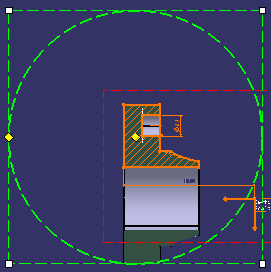 |
This task shows you how to clip the
2D and 3D backgrounds of layout views using a circular or polygonal
profile. |
 |
Open the Disk4.CATPart
document. Double-click Sheet.1 in the specification tree to open the layout
in the 2D window.
|
 |
-
Right-click the front view in the specification tree or
in the sheet and select Clipping > Clip View.
The Tools Palette is displayed with circular
and polygonal profile options with length and angle fields.
You can either select Circular profile or Polygonal
profile.
-
On selecting Circular profile, the
radius definition dialog box pops up.
-
On selecting Polygonal profile, the
default length and angle definition box is displayed.
-
Click to select the first point.
-
Draw the profile as needed.
-
Double click or select the first point to end
the profile creation.
 |
You can also select the Circular profile or Polygonal
profile using the contextual menu:
 |
-
Select the circular profile in this case.
Enter the radius in the Tools Palette or drag the radius on
the sheet.
You can see that the view has been clipped.
-
You can now reframe, resize and/or move the clipping
frame according to your design's needs:
Clicking on the clipped view will activate the
manipulators of profile.
-
To manipulate the control
points, drag the yellow manipulators.
-
To resize the profile drag
the white manipulators.
-
To move the entire profile
drag the frame itself using one of its green
dotted line.
|
Drag the white manipulators to resize the
profile.
 |
| |
- Clipping outline can be fully displayed or
invisible.
When displayed, the clipping outlines are also
printed, and visualized in 3D (except if
Hide in 3D option is active).
- Clipping outlines are non-selectable and
therefore cannot be dimensioned or annotated.
- Visualization properties of clipping
outlines can be customized in two ways:
- Customizing after the clipped view
creation, go to Edit > Properties
or right-click the view and select
Properties from contextual menu,
Visualization tab, Clipping
Outline field.
- Customizing global settings, go to Tools > Options > Mechanical Design > 2D Layout
for 3D Design, View Creation tab, Clipping
Outline field.
For more information, refer to
View Creation
> Clipping Outline.
- The visualization properties that can be
customized are:
- Display: display the
clipping outline. By default, this
option is checked.
- Color: By default, white
color is selected.
- Line type (only among the
first height linetypes): By default,
type 4.
- Thickness: By default,
index 4.
|
Change the color and linetype of the clip
profile.
-
Unclip the existing profile by selecting Unclip view
from the contextual menu.
-
Select Replace Clipping from the contextual
menu, to replace an existing clipping view.
The previous clipping is removed and a new clipping can be defined in
the same way as when using the command Clip View command. The graphic
properties of the replaced profile are applied to the newly defined
clipping profile.
|
 |
-
If a clipping view is
copied, the pasted view is a clipping view with the same profile than
the copied view.
- If a 2DL view is created with the command New View From by
selection a clipping view, the new view is a clipping view in which the
clipping profile is equivalent to the clipping profile of the reference
view.
-
If a clipping view is rotated its profile is also
rotated by the same angle.
If the view scale of a clipping view is modified, the
position and the size of the clipping profile are scaled too.
-
When the clipped part is exported to drawing, the
representation of the generated clipping outline follows Generative
Drafting options or Generative view styles, and thus may
differ from 2DL representation. If Tools > Options >
Mechanical Design > Drafting > Administration, Generative
view style field, Prevent generative view style usage
option is cleared, then user can select a predefined style when
generating a single view or the default style (DefaultGenerativeStyle)
is used when generating a full drawing. If Prevent generative view
style usage option is selected, then the linetype defined in
Mechanical Design > Drafting > View > View linetype is used.
- For pre-R18 2D layouts, where the view is not clipped, you can apply
clipping to a view by using the
Clip view command.
-
When Pre-R18 2D layouts with a clipped view are
exported to drafting and the drawing is updated, then the representation of the
generated clipping outline is also updated. The profile is updated as shown in the
image:
Pre-R18 2D layout exported to drafting:
on updating drawing in R18:
The linetype used for clipping view in pre-R18 was of the breakout
view. When exported to R18, the linetype
used for clipping view depends on Generative Drafting options or Generative view styles
which is of detail view linetype.
|
|

|